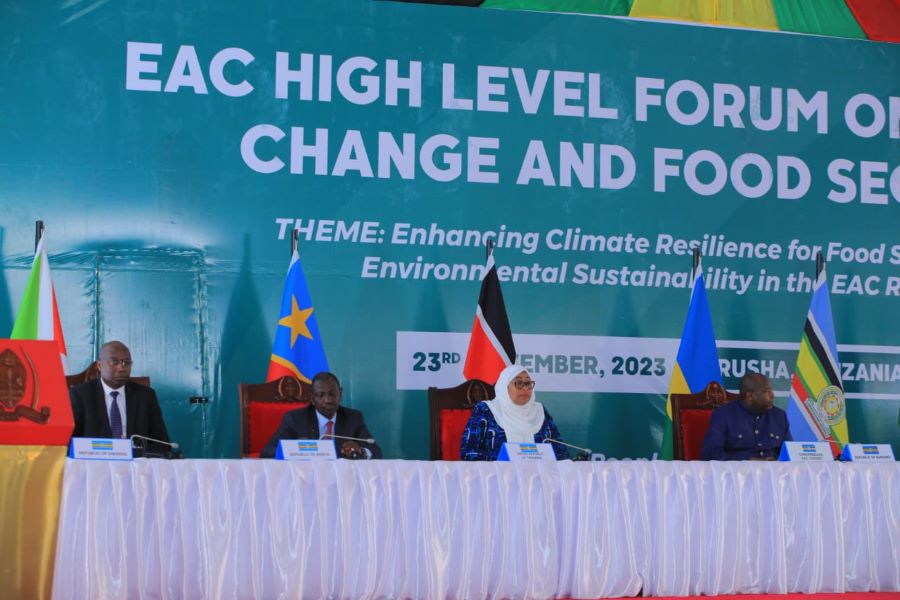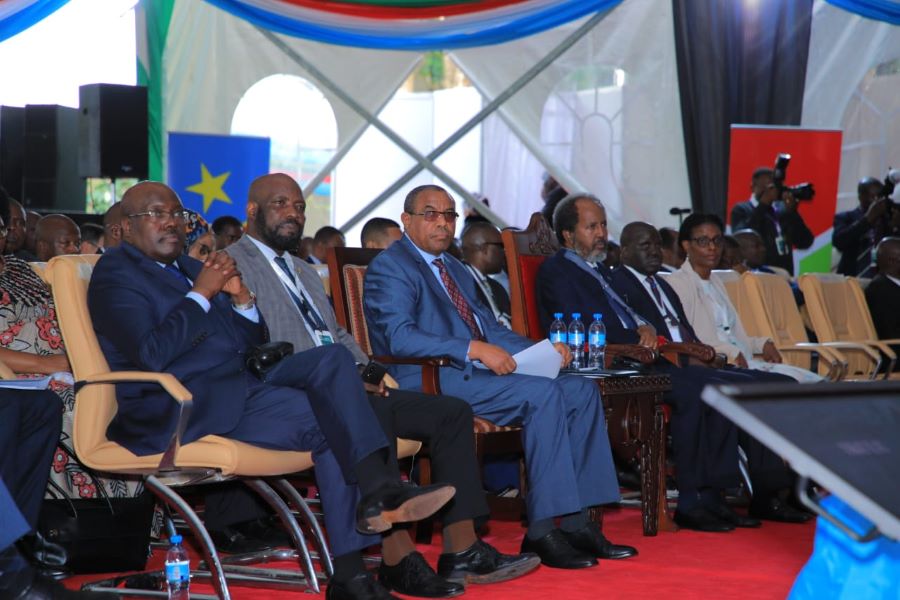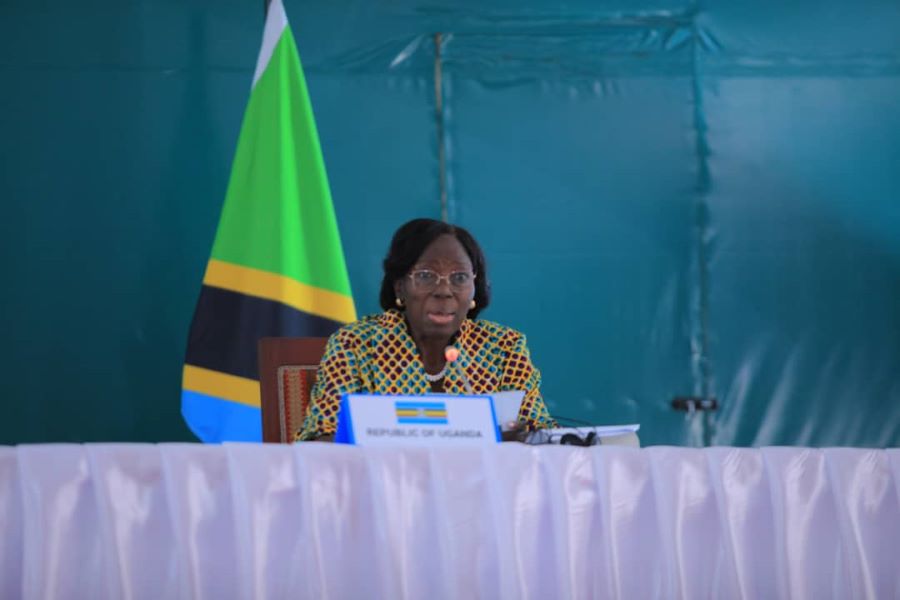
Climate Smart Agriculture and Green Renewable Energy the way to go to mitigate Climate Change and boost Food Security
East African Community Headquarters, Arusha, Tanzania, 24th November, 2023: The Summit of the East African Community (EAC) Heads of State is in agreement that increased investment in climate smart agriculture and renewable energy is the best approach to mitigate the impact of climate change, and improving access to and availability of food for their citizens.
The Heads of State further agreed that there was a need to improve rainwater harvesting to ensure increased availability of water for irrigation agriculture.
The Summit also agreed to reduce post-harvest losses of food through the adoption of modern technologies that will ensure better storage and distribution of agricultural products.
The Heads of State were also in consensus that increasing forest cover and jealously protecting the existing ones will increases the region and Africa’s prospects in carbon trading and climate financing vis-à-vis the rest of the world.
The Heads of State also disclosed that the EAC would approach the upcoming COP 28 Climate Summit to be held in Dubai, the United Arab Emirates, from 30th November – 12th December, 2023 as one bloc.
The Heads of State who spoke during the EAC High-Level Forum on Climate Change and Food Security in Arusha, Tanzania on Thursday further noted the importance of establishing a platform to share experiences on environmental sustainability, disaster management and cross-border management of natural resources.
Speaking at the forum, H.E. Evariste Ndayishimiye, the Chairperson of the Summit and President of Burundi, said that his country has nine (9) months of rain annually but was taking measures to become more climate resilient.
President Ndayishimiye said that Burundi was investing in agroforestry to protect its land against soil erosion, adding that the country embarked on afforestation programme five years ago to ensure that its landscape was covered by forests.
President Ndayishimiye called for joint efforts in the mobilisation of resources to mitigate the effects of climate change and enhance environmental sustainability.
On her part, Tanzania’s President Mama Samia Hassan Suluhu underscored the importance of climate smart agriculture in increasing food production, adding that the private sector has a crucial role to play in the initiative.
President Suluhu disclosed that Tanzania was investing in climate smart technologies through the Build Better Tomorrow, an initiative that is aimed at increasing the involvement of youth and women in agriculture to boost agricultural production and reduce poverty while conserving the environment.
President Suluhu emphasised the role of the private sector in post-harvest agro-processing and value addition, adding that the government was also facilitating irrigation schemes by building dams to harvest rainwater.
She disclosed that the government was facilitating access to climate financing by encouraging commercial banks to lend to green projects. To reduce greenhouse gas emissions, President Suluhu said that Tanzania has dedicated 25% of its national land to forests, saying this would serve as a carbon sink with the private sector also being encouraged to venture into carbon sinking.
President Suluhu revealed that due to increased agricultural production, Tanzania was now exporting rice, avocadoes and other horticultural exports to the regional and international markets. She added that the country was giving tax incentives to investors in green renewable energies, agricultural machinery and inputs and value addition in agriculture.
In his remarks, Kenya’s President William Ruto said that his country has prioritised the conservation of its water towers that are being fenced to guard against encroachment and destruction. He described Kenya as 80% arid and semi-arid saying that the country doesn’t have enough rain but has adequate water.
President Ruto said that the government had hired 1,000 new forest rangers to ensure that there is adequate human capital to protect the national forest cover and reiterated that the country’s commitment to plant 15 billion trees over the next 10 years to protect its environment and conserve its water towers.
“We are also making use of the National Youth Service by converting them into a green army to ensure that we don’t just plant but grow trees. It is easier to plant than grow trees,” said President Ruto, adding that the country was growing trees for the twin objectives of protecting the environment and making money through carbon trading.
On rainwater harvesting, President Ruto said that Kenya will build 100 mega dams for purposes of increasing food production through irrigation. He said that there were plans to increase the acreage under irrigation from 600,000 to 2 million acres.
President Ruto said that the country had registered 6.5 million farmers and distributed subsidised fertilisers to them by eliminating brokers, middlemen and cartels, adding that the fertiliser subsidies had enabled the country to increase maize production by 40 per cent from 40 million tonnes in 2022 to 61 million tonnes in 2023.
To manage post-harvest losses, President Ruto said that the country had purchased 100 driers to be distributed across the country.
On enabling access to climate financing, President Ruto said that there was a need to refashion multilateral financial institutions to give affordable financing for climate mitigation.

On his part, Rwandan Prime Minister Edouard Ngirente who represented President Paul Kagame at the forum, said that the country had opted to create synergy between the government and the private sector to increase investment in agriculture, which is largely considered as a risk sector by investors.
PM Ngirente disclosed that the government was investing in viable infrastructure including feeder roads and affordable financing at single digit interest rates to promote investment in agriculture.
PM Ngirente said that Rwanda was investing in cold rooms and storage facilities to manage post-harvest losses that he said were as high as 40% in Africa. He revealed that the country had established the Ireme fund to increase investment in climate smart agriculture and climate change mitigation.
The PM said that the government of Rwanda had invested seed capital of 100 million Rwanda francs even as he added that a further 300 million Euros had been mobilised for the fund, the goal being to encourage the private sector to invest more in agriculture.
PM Ngirente said it was an onerous but inevitable responsibility of EAC Partner States’ governments to ensure that there was availability, affordability and access to food for the 283 million EAC citizens.

Speaking on behalf of President Yoweri Museveni, Uganda’s 1st Deputy Prime Minister and Minister for EAC Affairs, Right Hon. Rebecca Alitwala Kadaga, said that Uganda was evicting people from its wetlands due to excessive use and abuse that has had devastating impacts on the environment.
Right Hon. Kadaga that the government was relocating those evicted from wetlands to other areas and encouraging them to undertake more environment-friendly activities such as cage farming and soil cultivation.
The 1st Deputy Prime Minister emphasised the importance of good food storage facilities noting that Africa was a land of contradictions whereby some countries could be under severe drought yet others were experiencing bumper harvests, adding that suitable storage facilities would ensure the availability and access to food by all.
Right Hon. Kadaga called for optimal use of the Congo and Nile rivers’ basins to increase the continent’s food production potential.
Giving the keynote address at the forum, H.E. Hailemariam Desalgn, the Chairperson of the Agrarian Revolution for Africa and former Prime Minister of Ethiopia, said that Africa must prioritise adaptation in its food systems to ensure resilience.
In his remarks, EAC Secretary General Hon. (Dr.) Peter Mathuki underscored the importance of EAC having a common position as it goes to COP 28.
Dr. Mathuki said that no country should have to choose between its development aspirations and climate change mitigation, adding that there was need for complementarity as opposed to competition among Partner States.
DOWNLOAD KEYNOTE ADDRESS - ‘Enhancing Climate Resilience and Sustainable Development in the East African Community Region’ by AGRA Board Chair H.E. Hailemariam Dessalegn
For more information, please contact:
Simon Peter Owaka
Senior Public Relations OfficerCorporate Communications and Public Affairs DepartmentEAC SecretariatArusha, TanzaniaTel: +255 768 552087Email: This email address is being protected from spambots. You need JavaScript enabled to view it.
About the East African Community Secretariat:
The East African Community (EAC) is a regional intergovernmental organisation of seven Partner States, comprising the Republic of Burundi, the Democratic Republic of Congo, the Republic of Kenya, the Republic of Rwanda, the Republic of South Sudan, the Republic of Uganda and the United Republic of Tanzania, with its headquarters in Arusha, Tanzania.
The EAC Secretariat is ISO 9001: 2015 Certified
